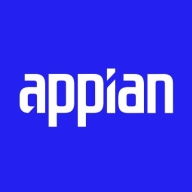

Pega Platform and Appian are competitors in the business process management space, each excelling in different areas. Pega holds the upper hand in enterprise-level solutions with robust features, while Appian excels in agile and rapid deployment.
Features: Pega Platform offers a comprehensive suite of features including robust case management, integration services, and no-code development, providing user-friendly solutions that reduce development time significantly. It effectively handles complex processes and supports rapid prototyping. Appian stands out with its low-code rapid development model, which allows for quick application delivery. It also offers cohesive architecture for case management and integration.
Room for Improvement: Pega needs improvements in UI and implementation ease, as its complexity can be challenging for developers. Licensing costs and cloud adoption are also areas for enhancement. Appian could benefit from a better user interface and more flexible components, improvements in offline capabilities, and seamless integration options.
Ease of Deployment and Customer Service: Pega provides flexible deployment options across on-premises, public, and hybrid cloud environments, but its technical support faces delays. Appian, with robust cloud deployment options, facilitates easier implementation and has a more responsive customer service, offering less customization but rated higher in support.
Pricing and ROI: Pega is seen as expensive with complex licensing models but delivers a strong ROI through enterprise capabilities. Appian is also pricier, yet offers competitive pricing with flexible licensing, providing substantial ROI through rapid development.
They see return on investment in terms of cost savings, time savings, more efficient processes, and more efficient employees.
Appian is very efficient, allowing us to build a lot of applications within a financial year, making it cost-effective.
The technical support for Appian rates as 10 out of 10 because they have a great support team.
Their customer service is responsive, and the team is very prompt for support.
The technical support is generally good.
The technical support from Pega is very low, rating a one or two out of ten.
I never needed support from the platform standpoint, but if additional features are required, we have regular meetings with the product team for feedback.
Pega's technical support team is very helpful.
On a scale of one to 10, Appian rates as a nine for scalability.
Initially, without much coding, I can easily handle five thousand records.
Appian is scalable, but it depends on how you build your applications.
Currently, big banking providers and insurance providers, even the members for healthcare payers, are using more than millions of operations on a daily or weekly basis.
It depends on how it has been designed and how it has been configured.
The stability of Appian would rate as nine, as it's a stable environment.
It has room to improve for use cases where the users are public facing, where anonymous users could come to a site and run a business workflow or interact with some data.
I would like to see more enhancement in the user interface to allow more freedom in designing the sites and pages.
If there is a very complex process that includes a lot of data transitioning and memory-centric processes, it consumes a lot of memory.
With the recent development of AI agents in Pega Platform 24.2, the adoption is not heavy due to regulations around using external LLM by customers, especially regulated customers in BFSS and healthcare.
Pega introduced Constellation, which allows a user to build a more engaging visual experience.
My learning curve in robotics has been challenging.
On the pricier side, both Appian and Pega are enterprise-level solutions, placing them on the slightly higher side.
The price of Appian, on a competitive landscape, is a little bit on the higher side for companies, rating maybe a 6.5.
The pricing of Appian is based on the number of users and generally ranges from 70 to 100 USD per user per month.
Pega is priced higher than open-source options like Flowable but is suitable for large-scale industries like banking and insurance.
The pricing is expensive, and this is an issue.
From a licensing perspective, it is higher than the competition.
Appian also utilizes AI for business users, providing a feature called process each view, enabling business users to create their own dashboards, reports, and gain insights from their data and processes using artificial intelligence.
The zero-code integration feature is remarkable, allowing for ease of data transfer and workflow enhancement.
It is easy for me to define the process and create configurable workflows.
Pega Platform is excellent for enterprise-level solutions with integrations to entire systems, including case management, service orchestration, CRM, decision-making capabilities, digital process automation, and AI-driven functionalities.
Management capabilities such as dashboards.
| Product | Market Share (%) |
|---|---|
| Pega Platform | 5.2% |
| Appian | 5.3% |
| Other | 89.5% |


| Company Size | Count |
|---|---|
| Small Business | 20 |
| Midsize Enterprise | 9 |
| Large Enterprise | 41 |
| Company Size | Count |
|---|---|
| Small Business | 9 |
| Midsize Enterprise | 15 |
| Large Enterprise | 68 |
Appian is a unified low-code platform and solution used by businesses to build enterprise applications and workflows. This product adapts to the needs of clients and the technologies they are already using to combine their data in a single workflow and maximize resources. The platform has four main components through which it transforms the work process for companies of various sizes. They are:
Appian is utilized across a diverse set of industries, including automotive and manufacturing, energy and utilities, education, financial services, telecom and media, transportation, retail, insurance, healthcare, and life sciences. The most frequent use cases of Appian are customer journey, governance, risk and compliance, operational efficiency, supply chain, distributed order management, and environmental, social, and governance (ESG) management.
Appian Features
Appian has various features that allow users to create solutions for their businesses. These features can be separated into a few groups according to function, including automation, low-code application development, and integrations and data. Some of the most frequently used features of Appian include:
Appian Benefits
The benefits of using Appian include:
Reviews from Real Users
A practice leader - digital process automation at a computer software company values Appian highly because the product is easy to develop, low-code, and has a good user interface.
Alan G., an advisory board member at Codecon VR, Appian offers a clear application life cycle, easy to learn documentation, and comes with a fundamentals course.
Pega Platform provides flexible business process management with a focus on rapid application development and automation through a low-code approach, enhancing efficiency across sectors.
Pega Platform is renowned for its ability to streamline operations with robust automation features, including robotic process automation and decision-making capabilities. Its intuitive interface and workflow management contribute to a reputation for enhancing business processes. Although users face challenges with integration limitations and high licensing costs, they benefit from rapid deployment and efficient process adaptations. The unified architecture reduces complexity, while case management and integration services support digital transformations in sectors such as banking, insurance, and healthcare.
What are the key features of Pega Platform?In industries like insurance, banking, healthcare, and government, Pega Platform is implemented to automate diverse workflows, supporting initiatives from claims processing to customer onboarding. Enterprises use Pega for case management and digital transformations, valuing its out-of-the-box integrations and real-time reporting capabilities to boost operational automation and enhance customer experiences.
We monitor all Business Process Management (BPM) reviews to prevent fraudulent reviews and keep review quality high. We do not post reviews by company employees or direct competitors. We validate each review for authenticity via cross-reference with LinkedIn, and personal follow-up with the reviewer when necessary.